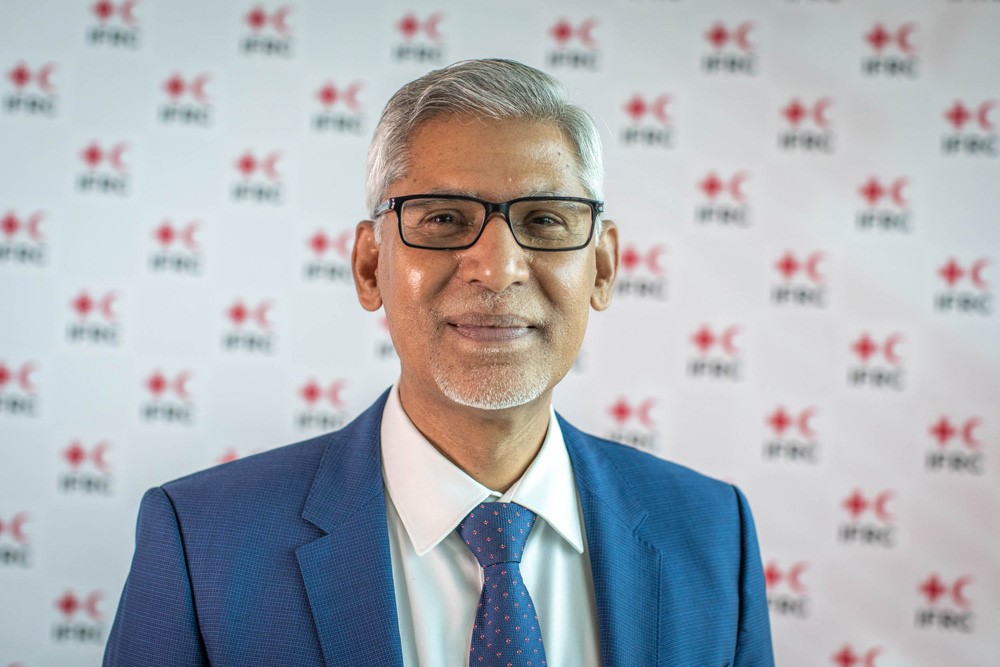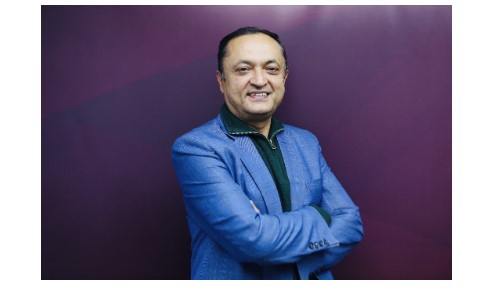‘This pandemic is far from over, so we need to increase global efforts to share vaccines’

Secretary General of the International Federation of RedCross and Red Crescent Societies (IFRC), JAGAN CHAPAGAIN, has extensive experience and a broad knowledge of the International Red Cross and Red Crescent Movement. The IFRC is the world’s largest humanitarian network that reaches 150 million people in 192 countries through the work of over 13.7 million volunteers. Mr Chapagain begun his career as a youth volunteer at the Nepal Red Cross, advocating for and representing community voices. He has spent more than 25 years with IFRC, working across Europe and Asia. Prior to becoming Secretary General, he was Under Secretary General for Programmes and Operations, Chief of Staff and Director of the Asia Pacific region. Mr Chapagain spoke to BHAGIRATH YOGI for South Asia Time on contemporary issues. Excerpts of theinterview:
You have been championing for vaccine equity to solve the public health emergency created by the Covid-19? Where do you think we are now?
It is very heartening to see all the work and commitments around COVAX and the G7 country pledges to donate more vaccines to poorer nations. However, the lack of equity in the current rollout of COVID-19 vaccines remains alarming. The poorest 50 countries in the world account for only 2% of doses reported administered globally, despite being home to 17% of the world’s population.
Current indications are that we need 60% to 70% of people to be vaccinated to reach sufficient immunity–both within countries and globally and we are far from reaching that target. Vaccinations must cover all parts of society, not just the most advantaged parts of it. If we have pockets of people who do not receive a vaccine, we will continue to see outbreaks. Vaccine equity will not just happen. It needs to be engineered and planned for and there is an urgency to do this now.
We encourage States to consider all possible measures to boost production, distribution, and equitable access to COVID-19 vaccines both between countries and within countries, to leave no one behind.
How do you see the G7 leaders’ decision in this regard? Are we moving in the right direction?
We welcome the G7 leaders’ decision to donate nearly a billion doses of vaccines by the next G7 in 2022. This is a step in the right direction but still represents less than 10% of the need as identified by WHO. We hope that there will be action on proposals to relax intellectual property barriers and to massively scale up knowledge transfer to break the current manufacturing logjam.
But ending the pandemic is not just about delivering more vaccines at a faster rate, it is also about ensuring countries have the infrastructure and human resources to get the vaccines from the tarmac into the arms of people with their full acceptance. We are already seeing examples where a lack of investment at the recipient country level, combined with late provision of doses, has led to vaccines expiring before they could reach vulnerable people. There is huge work to be done in community mobilization, otherwise vaccine hesitancy can undermine any campaign.
In countries that are receiving vaccine doses, we already see that the most vulnerable including migrants, and marginalized or ethnic minority communities, do not have equal or easy access to vaccination.
Equitable vaccination is a moral imperative, and we must come together in our shared humanity to ensure that everyone gets a vaccine, and that high risk and vulnerable people are prioritised everywhere. No one should be left behind and the Red Cross Red Crescent is working hard to reach the last mile and ensure that no one is forgotten.
You have supported the WHO and other organisation’s call for a new pandemic treaty. How do you think such a treaty will help fight future pandemics?
The COVID-19 has shown us in the most devastating and brutal way, the deadly consequences of not being able to cooperate in key areas. The COVID-19 response has been hugely impaired by inequities affecting some of the most vulnerable of our societies. We need bold new solutions –both in international and domestic laws – to avoid the same mistakes.
A global treaty alone will not accomplish this. In fact, the most important laws and policies will be at the national level. But a treaty process is a golden opportunity to negotiate some of the really hard questions and overcome the incentives that can undermine a sensible approach.
A successful treaty would inspire much more domestic and international investment in prevention and preparedness, particularly in the work of community health volunteers and workers, who put their lives at such great risk. It would commit to global equity in access to testing, vaccines and treatment and it would underline the rights of all – including migrants and refugees – to protection from pandemics. It would also underline the need for better and more aligned national and regional frameworks for pandemic preparedness.
With our experience in supporting states to develop and implement disaster law and policy around the world, IFRC and its members stand ready to provide their expertise and advice to governments and to support such a treaty to not only be powerful on paper but transformative in practice.
During your message to the World Health Assembly (WHA74), you called for a radical shift to re-prioritiseprevention and preparedness for health emergencies. What do you think needs to be done to translate it into action?
Disease outbreaks begin and end in communities. We saw this in the Ebola outbreaks in West Africa and the Democratic Republic of the Congo. We are seeing it now in this current pandemic.
Our member Red Cross and Red Crescent Societies and many other local actors have been at the forefront of the local response to COVID-19 with their unique reach into communities, their extended networks and scores of dedicated volunteers and staff. They have reached hundreds of millions with humanitarian assistance, public health and prevention measures during this pandemic.
Communities must be at the center of all planning and implementation efforts to prepare, detect and respond to health emergencies because they are the ones who will ultimately end the spread of disease. To do this they need to be better funded, trained, protected and supported to access to hard-to-reach populations where disease outbreaks hit the hardest. This is especially important in countries with poor health systems and weak infrastructure.
The radical shift we need is in how we invest in preparedness and prevention. Modest investments in preparedness and prevention yield large returns. But it is not just about more money: it’s about better money. Funding for health emergencies should be morepredictable, sustained and should prioritise community level action to facilitate the rapid scale-up of activities.
We need greater flexibility in the allocation of funds during health emergencies to enable course correction based on community feedback, and mechanisms to financially support community structures over time should be better developed.
We weren’t prepared for this pandemic and there is a high probability that we will experience another pandemic in the future. We cannot afford to be caught off guard again. Well-prepared communities will detect epidemics and stop them promptly.
The IFRC and ICRC have called upon humanitarian organisations to sign on the new Climate and Environment Charter. What was the imperative? How will it make a difference?
Climate change and environmental degradation are crises that threaten humanity now and in the future. While these crises affect us all, those most impacted are the poorest and most marginalized communities. We have no time to lose. We must act, at scale and in concert.
The massive scale of existing and predicted humanitarian impacts of the climate and environment crises means addressing them has become a priority for many humanitarian organizations. This needs to be a collective endeavour because no organization can tackle this alone. The humanitarian sector must be part of the solution. We have the science to help people adapt to a changing climate and environment while responding to and reducing these growing needs and we must use it. We also must walk our talk – greening our own work so that we are not part of the problem.
The Climate and Environment Charter for Humanitarian Organizations is designed to galvanize and steer greater collective climate action within the humanitarian sector and beyond. Through the Charter, we want to send a clear signal that humanitarian organizations have a key role to play in addressing the climate and environmental crises. The Charter intends to provide a clear vision and principles to guide humanitarian action in the face of these crises.
Protecting the lives and rights of present and future generations depends on action to cut greenhouse gas emissions, halt environmental degradation, build resilience and adapt to climate change, and reduce increasing risks. The Charter represents our sector’s high-level commitment to do our part, work together, ensure that our actions reduce the impacts of the crises and convince others to do the same.
Currently, 28 organizations have signed up to the Charter. Our hope is that more organizations will sign up and develop and implement their own targets to create a real and urgent transformation in the way we work as a sector and limit the human suffering resulting from the climate and environment crises.
While countries in Africa and Asia are desperately looking for covid vaccines, the new wave of Covid 19 has had devastating impact on countries especially India and Nepal? How is IFRC helping these countries?
The top priority is saving lives and enabling people most at risk to have access to adequate health care and vaccines as India and Nepal have been suffering record death rates due to COVID-19.
Infection rates may have stabilised or reduced in some areas, yet hospitals remain overloaded, which is why the IFRC has been playing a critical role working with the Red Cross and health authorities in both India and Nepal to get lifesaving oxygen equipment and other medical supplies to where they are needed the most.
In addition, the IFRC has been working with the National Societies to increase access to vaccination when available. Nearly 4,000 volunteers have been mobilized at community levels to generate public awareness about vaccines and support the Government in the vaccination sites.
This pandemic is far from over, so we need to increase global efforts to share vaccines, the ingredients, and technologies so that we can protect the most vulnerable and prevent tens of thousands of deaths in future waves of COVID-19.
At a personal level, how do you find yourself heading an organisation like the IFRC as the entire world is combating the Covid-19 pandemic?
I took helm of IFRC as Secretary General at the onset of the COVID-19 pandemic in February 2020. Looking back at the past 18 months, I feel very privileged to serve this network of good.
The pandemic has been a true global test on how local responders act in the absence of extensive international deployments.
As auxiliaries to their governments in humanitarian action, our member Red Cross and Red Crescent Societies have been responding to COVID-19 in their own communities, across countries through their local branches and millions of dedicated volunteers and professional staff.
Our own operations were also deeply affected and put to the test. Our staff and volunteers had to adapt to new ways of working—from home, virtually and distanced from one another. Some paid the highest price with their lives. Many lost family members and friends while often working in the face of fear and stigma.
We have had to adapt our ways of working very quickly to ensure that we could support the most vulnerable communities with supplies and services. This forced us to be more efficient, focus on building trust and strengthen our accountability to the communities we serve and the partners who support us.
I feel an immense responsibility to ensure that we come out of this crisis a united front, unfragmented, strengthened by our successes and even by our mistakes.
Voluntarism has been the cornerstone of the Red Cross movement? How do you see the future of voluntarism in the days to come?
I started out as a Nepal Red Cross volunteer 30 years ago and know first-hand how enriching and rewarding it is to dedicate time and effort to help others. Activism, humanitarianism, and participation have evolved tremendously in the last two decades.
The rapid advance of technology has brought new ways of self-organizing to a wider section of society, including crisis-affected communities and global volunteer networks. There has been a significant change in the way people and communities are self-organizing and self-mobilizing. Today 70% of volunteering happens outside formal organizations – volunteers long for a much quicker, flatter and more direct path to achieving impact.
IFRC’s Strategy 2030, which guides our work and priorities for the next decade, will focus on reimagining volunteering. Our aim is to inspire a true movement of people passionate about positive change.
We recognize the power of people to drive their own change and action. Therefore, we are focusing on connecting with self-organizing groups and individuals and other actors to support those already mobilizing to address our common goals.
Volunteers today have direct access to other volunteers all over the world, which not only builds a sense of unity, common purpose and pride in the work of the organization, but also enables joint learning, effort and impact. To capitalize on this opportunity, we are exploring creative ways, beyond social media, to connect volunteers across countries, regions and the world, expanding national volunteer models to include a distributed network of volunteers across borders, focused on co-creating and driving impact together.
A diverse and substantial volunteer base ensures that the Red Cross and Red Crescent remains rooted in the communities we support and that we are informed, guided, enabled, and led by them.


















Facebook Comments